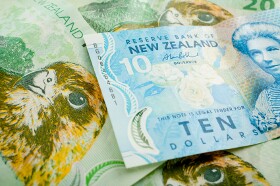The New Zealand dollar was the strongest among the most-traded currencies on the Forex market today despite the outlook for additional monetary easing from New Zealand’s central bank. Domestic macroeconomic data was favorable but seems to provide no noticeable boost to the currency.
Adrian Orr, Reserve Bank of New Zealand Governor, delivered a surprise unscheduled speech at the Victoria University of Wellington School of Government today. He signaled that the central bank considers using various tools, like expanding quantitative easing and cutting interest rates into the negative territory, to stimulate the economy that is struggling after the COVID-19 pandemic:
The policy tools that weâve used to date and the additional tools that we are considering using as a package in the near future are not new to central banking. The instruments include various forms of negative wholesale interest rates, further quantitative easing using large scale purchases of domestic and foreign assets, direct lending to banks, and forward guidance as to what needs to be done under certain conditions. However, we acknowledge that these tools are technical and unfamiliar to most New Zealanders. We recognise we have an ongoing communications challenge to ensure people remain confident in our intentions and actions.
As for macro data, Statistics New Zealand reported that the overseas trade index rose by 2.5% in the June quarter of 2020 compared with the previous three months. The increase exceeded by far the median forecast of a 0.6% increase. The index dropped by 0.6% in the March quarter.
NZD/USD was flat at 0.6757 as of 9:47 GMT today after rising to the session high of 0.6788 earlier. EUR/NZD fell from 1.7617 to 1.7553. NZD/JPY was up from 71.60 to 71.72 but retreated from the session maximum of 71.96.
If you have any questions, comments, or opinions regarding the New Zealand Dollar, feel free to post them using the commentary form below.
